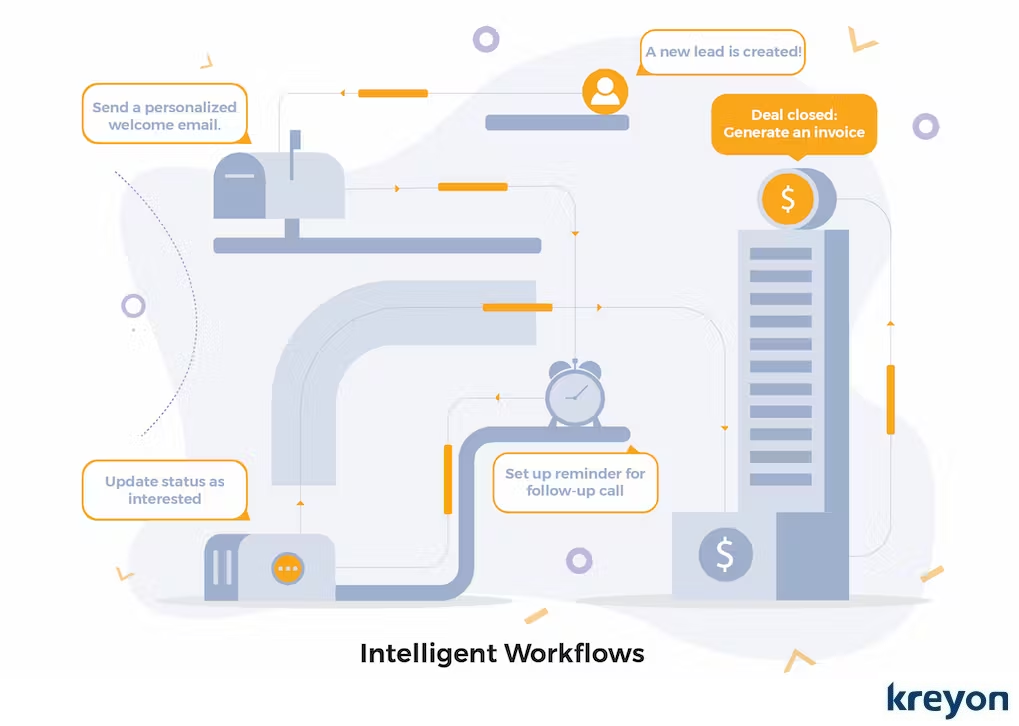CRM Implementation for Real Estate Industry: Key considerations for Implementing a CRM System for Real Estate

CRM Implementation for Real Estate industry can enhance sales and marketing efforts, streamline lead management, and improve customer service. CRM can help you manage leads, track interactions with clients, and automate many tasks, saving you time and improving your workflow.
CRM implementation for real estate companies helps them manage their customer relationships more effectively. By using CRM software, you can keep track of all your interactions with clients, from the first contact to the final sale, and beyond.
CRM software can help you manage your prospecting data, score leads based on merit, manage lead interest for every property listing. It can improve your sales considerably by making all incumbent processes more efficient.
Here are some key considerations for implementing a CRM tailored to the real estate industry:
Lead management:
Develop a robust lead management system within the CRM to track and organize leads. Capture leads from various sources, such as your website, social media, and marketing campaigns. Implement automation to assign leads, track interactions, and set reminders for follow-ups.
The leads can be managed for each property listing. The property list or the inventory can also show the prospective list of clients who are interested in buying or renting that property.
Property and Listing Management:
Customize the CRM to manage property details, listings, and inventory. Include information such as property specifications, pricing, availability, and property history. Integrate with MLS (Multiple Listing Service) or property listing platforms to automatically update property information.
Every property listing can have a competitive bidding for sale too. The competitive bids from prospects are based on the demand and supply of the properties.
Contact and Customer Management:

Create a centralized database to store contact information, customer preferences, communication history, and notes. Segment contacts based on criteria such as buyers, sellers, investors, or tenants to personalize marketing and communication.
CRM helps real estate companies to touch base with their customers and stay on top of their minds with effective & personalised follow ups.
Email Marketing and Automation:
Real estate companies can utilize email marketing features within the CRM to send targeted and automated email campaigns. Create personalized email templates for property updates, newsletters, open house invitations, and follow-ups.
Automate drip campaigns to nurture leads and maintain engagement with leads. The marketing campaigns can be created for specific properties with latest updates to interested customer groups.
Sales Pipeline and Deal Tracking:
You can design a sales pipeline that aligns with your real estate sales process. Track deals and stages from initial contact to closing. Implement automation to trigger actions based on deal progress, such as assigning tasks, sending reminders, or generating documents.
The deal tracking process can help you uncover the average time for closing deals, average revenue, sales commissions, and detailed financial aspects to improve your profitability.
Document management:

Integrate document management capabilities within the CRM to store and organize important documents, such as contracts, agreements, property photos, and inspection reports. Ensure easy access and secure sharing of documents with clients and team members.
The documents can be shared with the clients using the CRM system. All property related documents, ownership, tax records etc. can be found with each property listing making it convenient for real estate companies to manage more properties with ease.
When evaluating CRM systems, it’s essential to consider your specific needs and requirements. For example, if you specialize in commercial real estate, you may need a system that can handle complex lease agreements.
Integration with Property Valuation Tools:
You can Integrate the CRM with property valuation tools or custom valuation software to provide instant property valuations to clients. This can enhance customer experience and facilitate quick decision-making.
Property valuation tool can help clients understand and assess value of each property and make informed choices. The property valuation tool can also help owners decide the expected value inline with prevailing market standards.
Calendar and Appointment Scheduling:
Incorporate a calendar and appointment scheduling functionality into the CRM. Enable agents to schedule property showings, meetings, and follow-ups directly within the system. Sync calendars with popular email platforms to avoid scheduling conflicts between different agents.
The calendar and scheduling system can manage the number of prospect visits to different sites, conversions and events for property shows etc. The marketing efforts can be streamlined and assessed effectively with a CRM system.
Referral and Agent Management:
A real estate CRM can use features to manage agent relationships and referral programs. It can help companies track agent performance, referrals, and commission payouts within the CRM.
It can also provide tools to incentivize referrals and foster collaboration among agents. The analysis of agents and their performance management can help in improving the overall sales efforts.
Reporting and Analytics:

You can implement reporting and analytics capabilities to track key performance indicators (KPIs) such as lead conversion rates, sales revenue, agent productivity, and marketing campaign performance. Generate custom reports and dashboards to gain insights and make data-driven decisions.
Another benefit of CRM implementation for real estate is the ability to use data analytics to improve your marketing efforts. With a CRM system, you can track the effectiveness of your marketing campaigns, such as email newsletters or social media ads.
You can also use data analytics to identify trends in your sales data, such as which properties are selling quickly and which are not. By using this information, you can adjust your marketing efforts to better target your clients’ needs and preferences.
Customizing Your CRM to Fit Your Real Estate Needs:
Choosing the right CRM system for your real estate business is critical to ensuring a successful implementation.
There are many factors to consider when choosing a CRM system, including the features and functionality, ease of use, and cost.
Once you’ve chosen the right CRM system for your real estate business, you’ll need to customize it to fit your specific needs. In some cases, it may need additional features tailored to your business needs.
You’ll also need to consider how the system will integrate with your existing software, such as your email client or accounting software. It may involve configuring the system to match your business processes and workflows. You might need to customize the user interface to make it easier for your team to use.
Conclusion:
Remember to involve stakeholders, train users, and continuously monitor and optimize the CRM system to ensure successful implementation and adoption. Consider working with CRM implementation consultants who have experience in the real estate industry to provide insights and guidance throughout the process.
CRM implementation for the real estate industry is becoming increasingly important as competition in the industry grows. By implementing a CRM system, you can manage your leads, track interactions with clients, and automate many tasks, saving you time and improving your workflow.
However, implementing a CRM system is not without its challenges. It’s essential to choose the right system, customize it to fit your needs, and train your team to use it effectively.
Kreyon Systems offers Custom CRM development for top Real Estate companies tailored to the industry needs. If you need a customized CRM software, please reach out to us.
